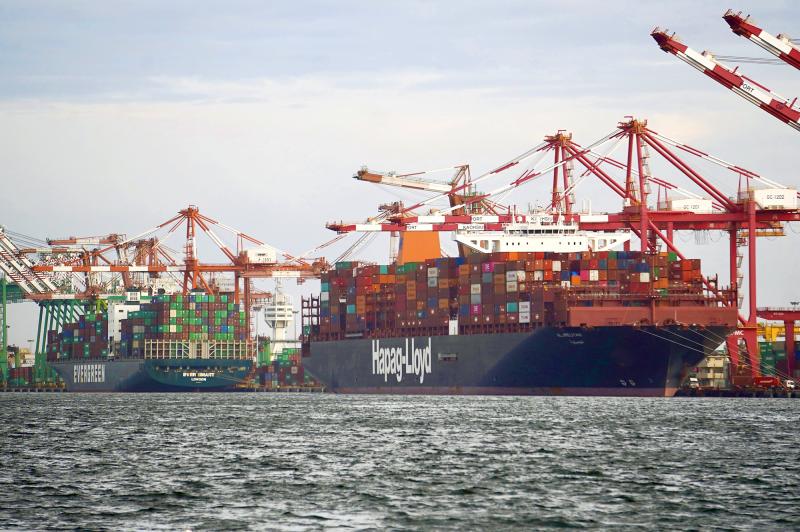Throughput at the nation’s major ports rose more than 6 percent to a new high last year, as exports soared on the back of solid global demand, the Directorate-General of Budget, Accounting and Statistics (DGBAS) said on Thursday last week.
Cargo handled at major international ports — such as Port of Kaohsiung, Port of Keelung, Port of Taichung and Port of Taipei — totaled about 750 million shipping tonnes last year, up 6.7 percent from a year earlier, agency data showed. Shipping tonnage is the measurement used to bill cargo handled by ports.
As the nation’s export performance improved last year, port throughput reversed a year-on-year 3.8 percent decline in 2020 and a 1.4 percent drop in 2019, the DGBAS said.

Photo: CNA
Riding a wave of strong demand for emerging technology products as well as raw materials as part of a global economic recovery amid the COVID-19 pandemic, Taiwan’s exports climbed to a record high, with annual growth of almost 30 percent.
The agency said that cargo loading volume reached about 308 million shipping tonnes last year, up 5.3 percent from a year earlier and accounting for 41.1 percent of total port throughput, while cargo unloading volume was about 442 million shipping tonnes, up 7.7 percent from a year earlier, making up 58.9 percent of the total.
The Port of Kaohsiung handled the largest volume of cargo last year with about 440 million shipping tonnes, which accounted for 58.6 percent of the nation’s total throughput, followed by the Port of Taichung (139 million shipping tonnes, or 18.6 percent), the Port of Taipei (89.67 million shipping tonnes, or 12 percent) and the Port of Keelung (65.46 million shipping tonnes, or 8.7 percent), the DGBAS said.
Last year, Taiwan’s major ports handled 552 million shipping tonnes of container cargo, up 6 percent from a year earlier and accounting for 73.6 percent of the total, the agency said.
Pipeline cargo, including crude oil and other liquefied items, reached 56.95 million shipping tonnes last year to make up 7.6 percent of total throughput, followed by coal (5.4 percent), iron sand (3.7 percent) and iron ore (3.1 percent).

SELL-OFF: Investors expect tariff-driven volatility as the local boarse reopens today, while analysts say government support and solid fundamentals would steady sentiment Local investors are bracing for a sharp market downturn today as the nation’s financial markets resume trading following a two-day closure for national holidays before the weekend, with sentiment rattled by US President Donald Trump’s sweeping tariff announcement. Trump’s unveiling of new “reciprocal tariffs” on Wednesday triggered a sell-off in global markets, with the FTSE Taiwan Index Futures — a benchmark for Taiwanese equities traded in Singapore — tumbling 9.2 percent over the past two sessions. Meanwhile, the American depositary receipts (ADRs) of Taiwan Semiconductor Manufacturing Co (TSMC, 台積電), the most heavily weighted stock on the TAIEX, plunged 13.8 percent in

A wave of stop-loss selling and panic selling hit Taiwan's stock market at its opening today, with the weighted index plunging 2,086 points — a drop of more than 9.7 percent — marking the largest intraday point and percentage loss on record. The index bottomed out at 19,212.02, while futures were locked limit-down, with more than 1,000 stocks hitting their daily drop limit. Three heavyweight stocks — Taiwan Semiconductor Manufacturing Co (TSMC, 台積電), Hon Hai Precision Industry Co (Foxconn, 鴻海精密) and MediaTek (聯發科) — hit their limit-down prices as soon as the market opened, falling to NT$848 (US$25.54), NT$138.5 and NT$1,295 respectively. TSMC's

TARIFFS: The global ‘panic atmosphere remains strong,’ and foreign investors have continued to sell their holdings since the start of the year, the Ministry of Finance said The government yesterday authorized the activation of its NT$500 billion (US$15.15 billion) National Stabilization Fund (NSF) to prop up the local stock market after two days of sharp falls in reaction to US President Donald Trump’s new import tariffs. The Ministry of Finance said in a statement after the market close that the steering committee of the fund had been given the go-ahead to intervene in the market to bolster Taiwanese shares in a time of crisis. The fund has been authorized to use its assets “to carry out market stabilization tasks as appropriate to maintain the stability of Taiwan’s

STEEP DECLINE: Yesterday’s drop was the third-steepest in its history, the steepest being Monday’s drop in the wake of the tariff announcement on Wednesday last week Taiwanese stocks continued their heavy sell-off yesterday, as concerns over US tariffs and unwinding of leveraged bets weighed on the market. The benchmark TAIEX plunged 1,068.19 points, or 5.79 percent, to 17,391.76, notching the biggest drop among Asian peers as it hit a 15-month low. The decline came even after the government on late Tuesday authorized the NT$500 billion (US$15.2 billion) National Stabilization Fund (國安基金) to step in to buoy the market amid investors’ worries over tariffs imposed by US President Donald Trump. Yesterday’s decline was the third-steepest in its history, trailing only the declines of 2,065.87 points on Monday and